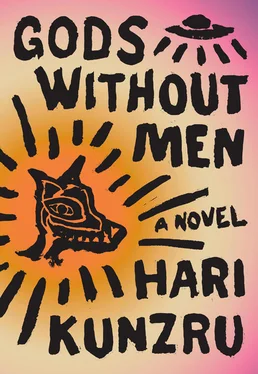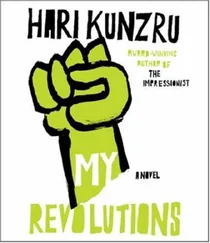“Evil past actions are very potent, Judy. The cycle of ignorance is inexhaustible.”
“Don’t come on to me with all that mystical shit. I had it with prophecy.”
“It’s not the same.”
“Sure is. You just can’t see it yet.”
Coyote avoided her. He was as slippery as ever. She caught up with him one night in Mulligan’s and told him flat-out he was killing Judy with his filthy chemicals. Not just her. Everyone. He was poisoning everybody. Why was he causing so much harm?
He just laughed. “What you care?” he asked. “You ain’t even sure any of it’s real.”
He knew how to get her. She turned and left, his howl of triumph in her ears.
Somehow Judy struggled on. She didn’t die. She took up hobbies. Basketry. Needlepoint. Quilting. All the varieties of warp and weft. After a few years the meth craze passed its peak, headed on to other towns. Coyote diversified. He was moving money through L.A. and Vegas. He had something going with computers, claimed he could tap into the New York Stock Exchange and tinker with all the ups and downs. That was bullshit, had to be. He was small-time. If he was such a big shot, how come he was out in some no-account place in the desert? He had friends on a reservation down near Yuma who were making big bucks from gambling. He started driving down to see them once or twice a month, coming back with whole crates of gadgetry, things he said arrived through air-conditioned tunnels from across the border. It was hard to say what he was doing and Dawn doubted he knew himself. He said he was part of the communications revolution. There were boxes of calling cards in the house. Cell phones, police-radar detectors. It was a compulsion, an addiction. Coyote never saw a fence he didn’t want to tunnel under. He had to mess with stuff, connect things together. He had a rage for transformation.
And so it went on. They all grew older. Things changed, sometimes quickly, sometimes so slow you didn’t even notice it happening.
Up ahead, Dawn could see a light.
Coyote’s battered old RV was parked at the edge of a dry lake. A couple of lamps were running off a generator, illuminating a patch of ground by the door. He reclined on a folding chair, a gas mask slung round his neck, drinking Jack and Coke mixed in a plastic bottle. When they drove up he pulled out a couple more chairs and they gave him the chocolate milk and then sat and smoked a joint, each thinking their own thoughts.
So, Judy said, when she couldn’t contain herself any longer. You got any for me to try?
Just before sunrise, Dawn drove Lisa back to her car and watched her fumble with the keys. In convoy they drove slowly up the hill to the motel. She hoped that would be the end of it, but when the boy disappeared, she knew she was probably responsible. Not in any way you could explain to a cop or a reporter. She hadn’t done anything wrong. But by taking Lisa out there, she’d got her family involved. They were mixed up with Coyote, mixed up in the paths and flows. Whatever was happening, Dawn didn’t want any part of it. It wasn’t her concern. She knew now — knew for sure — that she was still in the dome, descending through the realms of existence, heading toward the horror. All was not lost. At the edge of consciousness, she was beginning once again to catch the drone, the high white sound of reality.
Do not seek to know what is above you. Do not seek to know what is below you. Do not seek to know what is before you . The problem with modern people — one of the problems — was that they’d forgotten how to be humble. You could ride the subway, crammed together with all the other morning commuters on their way into Manhattan, and something in the book you were reading would make you pause and look around. Then you’d see the faces, ordinary faces that on other days (or in the old days, the days before ) you’d not have thought twice about, men and women blandly confident of their importance in the scheme of things, assured that as inhabitants of a global city, citizens of the most powerful country on the planet, they were the inheritors of certain rights, among them the right to know the world in its totality, or if they chose not to know (for they had other claims on their time, such as working and being entertained), then for others to know on their behalf, so that an explanation could potentially be made to them, or if not to them, then to an expert who would receive it and act in their best interest. They looked so ugly to her, all the morning people, because when Raj went missing she’d seen the flip side of their self-assurance: the outrage when something unknowable reared up before them, not just unknown for now, because they or their designated expert had yet to enquire into the matter, had yet to Google the search term or send the e-mail or write the check for the correct amount to the relevant company or government department, but unknowable in principle, inaccessible to human comprehension. Their fear made them dangerous — murderous even — for in their blind panic they’d turn on whoever they could find as a scapegoat, would tear them into pieces to preserve this cherished fiction, the fiction of the essential comprehensibility of the world.
Lisa knew the true face of the morning commuters, for they’d come at her, ripped at her flesh with their talons. She’d seen them, and ever since, the work of her life had been to recover herself, to function in subway carriages and department stores and checkout lines among people who’d hated her, who’d wanted her to die so their world could carry on feeling moral and meaningful. The lesson she’d learned (this was another part of the work, to see what had happened as a lesson, as something from which she could gain, instead of a wound that went almost to the bone and would probably never heal) was that knowledge, true knowledge, is the knowledge of limits, the understanding that at the heart of the world, behind or beyond or above or below, is a mystery into which we are not meant to penetrate. Before, in her old life, she’d not had a name for it. Then Raj had disappeared and been returned to her and after that she’d found a name but kept it to herself, because she felt embarrassed in front of her husband and her clever secular New York friends. Now she could call it God, and say it out loud; she could ride the subway into Manhattan replete in her understanding, confident that though the world was unknowable, it had a meaning, and that meaning would keep her safe and set her free. Had anyone suggested the conviction she felt might have anything in common with the conviction she derided in the other passengers, she would have reacted angrily, violently, because her feelings, her self-knowledge, had been earned, authorized by suffering, while theirs was mere ignorance.
She felt like she’d been destroyed and rebuilt again. She felt, if she had to give a name to her feeling, symbolic , as if she now stood for something greater and more significant than herself, stood for the knowledge of limits, was — no, not God’s representative, nothing so grandiose or egotistical — just one of His signposts, a person in the crowd whose life story pointed toward Him, showed the way out of the vanities of this world and into reverence for the unknowable, impenetrable beyond.
So much of this had been unclear to her before she joined the group. Esther, in particular, had been gentle and compassionate in leading her along the path. She’d had questions — that was why she’d sought them out in the first place, a half-dozen women more or less like herself, professional, college-educated, in their thirties and forties. They’d gather once or twice a month, usually at Esther’s place. It was, Esther joked, much like a hundred other book groups meeting all over Brooklyn, except they had something more on their minds than whether they’d been entertained or moved or convinced by the doings of a bunch of made-up characters. It felt good to be surrounded by these new friends. None of them were preachy or overbearing. They were just ordinary down-to-earth Jewish women, coming together to discover more about their shared culture. Of course Lisa knew they accorded her a special status. There was an aura around her, a little frisson of glamour. They’d ask, shyly, how she’d coped when the media frenzy was at its height. They’d use her as an example of suffering, dig out apt quotations to share.
Читать дальше












